[vc_row][vc_column][vc_single_image image=”949″ img_size=”full” alignment=”center”][vc_custom_heading text=”“A Piece of My Mind”” font_container=”tag:h1|font_size:50px|text_align:center|color:%232633ef” google_fonts=”font_family:Bitter%3Aregular%2Citalic%2C700|font_style:700%20bold%20regular%3A700%3Anormal”][vc_custom_heading text=”July 2023 Newsletter” font_container=”tag:h1|font_size:30px|text_align:center|color:%232633ef” google_fonts=”font_family:Bitter%3Aregular%2Citalic%2C700|font_style:400%20regular%3A400%3Anormal”][/vc_column][/vc_row][vc_row][vc_column width=”2/3″][vc_column_text]
Advancing Christian Faith and Values,
Defending Religious Liberty for All,
Supporting Civility and the Common Good
through Preaching, Teaching, Writing,
Activism and Reasoned Conversations
www.donaldshoemakerministries.com[/vc_column_text][/vc_column][vc_column width=”1/3″][vc_single_image image=”1304″ img_size=”full” alignment=”center”][/vc_column][/vc_row][vc_row][vc_column][vc_column_text]
Tom Hank’s Words about Truth
at Harvard’s Commencement
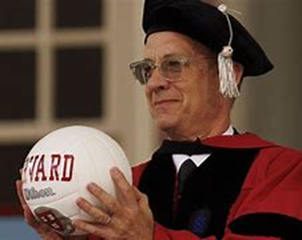 “Truth to some is no longer empirical, no longer based on data, common sense, or even common decency – telling the truth is no longer the benchmark for public service, no longer the salve to our fears nor the guide to our actions. Truth is now considered malleable, by Opinion, Narrative, by Zero-Sum Endgames.”
“Truth to some is no longer empirical, no longer based on data, common sense, or even common decency – telling the truth is no longer the benchmark for public service, no longer the salve to our fears nor the guide to our actions. Truth is now considered malleable, by Opinion, Narrative, by Zero-Sum Endgames.”
– Tom Hanks speaking at Harvard University’s 372nd commencement on May 25
[/vc_column_text][/vc_column][/vc_row][vc_row][vc_column][vc_column_text]
 A “Good Word” for Independence Day
A “Good Word” for Independence Day
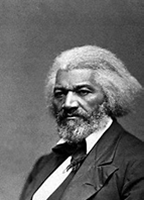 Frederick Douglass (1817 or 1818-1895)
Frederick Douglass (1817 or 1818-1895)
Slave, American social reformer, abolitionist, orator, writer, and statesman. After escaping from slavery in Maryland, he became a leader of the abolitionist movement. He became famous for his oratory and antislavery writings.
The Continuing Relevance of Frederick Douglass
By Ilya Somin, The Volokh Conspiracy blog hosted by Reason, February 4, 2023
Used by permission of the author
One of Douglass’ most famous works was his 1852 July 4 speech, “What to the Slave is the Fourth of July?” This is today mainly remembered for its blistering condemnation of American slavery and hypocrisy about liberty. But it’s worth emphasizing that it also praises the ideals of the American Founding, and even the founders themselves, as in this passage:
The signers of the Declaration of Independence were brave men. They were great men too — great enough to give fame to a great age. It does not often happen to a nation to raise, at one time, such a number of truly great men. The point from which I am compelled to view them is not, certainly, the most favorable; and yet I cannot contemplate their great deeds with less than admiration. They were statesmen, patriots and heroes, and for the good they did, and the principles they contended for, I will unite with you to honor their memory.
They loved their country better than their own private interests; and, though this is not the highest form of human excellence, all will concede that it is a rare virtue, and that when it is exhibited, it ought to command respect. He who will, intelligently, lay down his life for his country, is a man whom it is not in human nature to despise. Your fathers staked their lives, their fortunes, and their sacred honor, on the cause of their country. In their admiration of liberty, they lost sight of all other interests.
 They were peace men; but they preferred revolution to peaceful submission to bondage. They were quiet men; but they did not shrink from agitating against oppression. They showed forbearance; but that they knew its limits. They believed in order; but not in the order of tyranny. With them, nothing was “settled” that was not right. With them, justice, liberty and humanity were “final;” not slavery and oppression. You may well cherish the memory of such men.
They were peace men; but they preferred revolution to peaceful submission to bondage. They were quiet men; but they did not shrink from agitating against oppression. They showed forbearance; but that they knew its limits. They believed in order; but not in the order of tyranny. With them, nothing was “settled” that was not right. With them, justice, liberty and humanity were “final;” not slavery and oppression. You may well cherish the memory of such men.
Both Douglass’ denunciation of slavery and hypocrisy and his praise of the American Revolution and Declaration of Independence are relevant to current debates about how we should teach and think about American history. The former is a rebuke to those on the right who seek to minimize or ignore America’s wrongs. The latter to those on the left who claim its liberal ideals are insignificant compared to those wrongs, or even contributors to them.[/vc_column_text][/vc_column][/vc_row][vc_row][vc_column][vc_column_text]
Grace Community Church
of Seal Beach, California

Picture of a large portion of the congregation taken
between our 2nd and 3rd Sunday services (c. 2004).
It has always been a privilege to speak at this attentive church, since I first had the opportunity in the late 1970’s.
I’ll have that opportunity again on JULY 16, when I speak on Mark 10:32-44
“I Wanted ‘The High Road’ but Jesus Gave Me ‘The Low Road’”
Sunday morning services are at 8:00, 9:30 & 11:00.
View them live or later at:
www.gracesealbeach.org[/vc_column_text][/vc_column][/vc_row][vc_row][vc_column][vc_column_text]
“The Lord’s Prayer” Petition 5 –
Must We Forgive to be Forgiven?
“Forgive us our debts, as we also have forgiven our debtors.”
– Matthew 6:12 ESV
“For if you forgive others their trespasses, your heavenly Father will also forgive you, but if you do not forgive others their trespasses, neither will your Father forgive your trespasses.” – Matthew 6:14-15
This is the only commentary Jesus provided for the prayer he told us to pray. Did he (and Matthew) realize we would especially question this petition?
We’ve got two big problems. We need forgiveness from God and from others, and we need to extend forgiveness to others. The Lord’s Prayer helps us care for both of these big problems.
In the second half of The Lord’s Prayer we pray for ourselves and our needs. We’ve seen how we pray for our physical needs (“Give us this day our daily bread.”). Now we see how we pray for our relational needs (“Forgive us our debts, as we also have forgiven our debtors.”)
On October 12, 2011 a disgruntled ex-husband entered a beauty salon in Seal Beach, California and shot to death his ex-wife and seven others in the worst mass murder in Orange County history. As chaplain for the police department I immediately ended the sabbatical I was on and focused my time and energy on this traumatic event for weeks (I was less than three months from retirement as senior pastor of my church and this was the worst event of my 42 years of ministry).
I attended most of the funerals and officiated at the funeral for the salon owner. I told the hundreds in attendance, “I don’t believe in unconditional forgiveness.” At another funeral the pastor said, “We need to forgive.” An officer leaned over to me and said, “I have a problem with forgiveness.” Me too. So we (two pastors) had conflicting words on forgiveness. Who’s right?
Forgiveness Principle #1 – Pick your Term!
In Jesus’ instructions, the text uses three different Greek words:
“Debt” (opheilema – Matthew 6:12) – “Forgive us our debts”
This is an obligation we owe (like the balance owed on your credit card). Too big to pay, but it must be erased—somehow.
“Transgression” or “Trespass” (paraptoma – Matthew 6:14-16)
We have crossed a line we should not have crossed—a line separating obedience from disobedience.
“Sin” (hamartia – Luke 11:4) – “Forgive us our sins”
This is the common word for “sin” – “to miss the [moral] mark.”
As a childhood Lutheran, I would pray, “Forgive us our trespasses.” But later I learned that many pray, “Forgive us our debts” (as in the very familiar song by Albert Malotti). Lutherans have “transgressions”; Baptists have “debts.”
Forgiveness Principle #2 – We all have sinned and need Forgiveness!
Our wrongs are summed up in the confession of The Book of Common Prayer, “We have not loved [God] with our whole heart; we have not loved our neighbors as ourselves.” They include sins of the heart, disposition and act.
Forgiveness Principle #3 – Forgiveness is Conditional
(not “Unconditional”) and yet Very Generous.
We are to forgive as God forgives us. And God forgives us conditionally:
“If we confess our sins, he is faithful and just to forgive us our sins” (1 John 1:9).
American Evangelical Christians widely teach that forgiveness should be unconditional. “As soon as someone wrongs you, immediately forgive that person in your heart.”
But what did Jesus teach? He taught forgiveness is conditional: “If your brother sins, rebuke him, and if he repents, forgive him, and if he sins against you seven times in the day, and turns to you seven times, saying, ‘I repent,’ you must forgive him” – Luke 17:3-4.
So forgiveness is conditional, but it is also very generous and open to the reality that we may sin again and again, even with the same sins. Are we “Christ-like” in our willingness to forgive?
 Forgiveness Principle #4 – Forgiveness is primarily Inter-relational; it is not primarily Therapeutic.
Forgiveness Principle #4 – Forgiveness is primarily Inter-relational; it is not primarily Therapeutic.
(contrary to the message on the right)
Many teach immediate forgiveness as a way to keep one’s own psychological health. This isn’t biblical “forgiveness,” but the Bible does consider our inner wellbeing: “Let all bitterness and wrath and anger and clamor and slander be put away from you, along with all malice” – Ephesians 4:31, cf. 4:32; see Philippians 4:4-9.
Forgiveness Principle #5 – We would be Hypocrites to expect God to forgive us more than we are willing to forgive others.
“Forgive us our debts, as we forgive our debtors” – this petition creates a proportion, a standard of measurement. When we pray “The Lord’s Prayer” we are not asking God to forgive us more than we are willing to forgive others.
Read the parable of the “forgiven but unforgiving servant” (Matthew 18:21-35). The servant received massive forgiveness from his master (typifying God’s forgiveness). But the servant refused to forgive another servant who owed him a comparatively small amount (typifying unwillingness to forgive others). Result: the master’s original forgiveness of the massive debt was revoked and the servant became subject to the penalties of his debt.
Forgiveness Principle #6 – A Genuine Request for Forgiveness has certain Characteristics, such as:
1. Remorse – “I am truly sorry.”
2. Repentance – “From the heart I confess to you that I did wrong.” Dietrich Bonhoeffer said, “Cheap grace is the preaching of forgiveness without requiring repentance” (The Cost of Discipleship).
3. Restitution – “I am willing to do what I can to make things right.” (This point should be kept flexible—it is as much an accountability lesson for the offender as it is a payment to the person wronged.)
4. Resolve – “By God’s strength, I will not do this again.” (Fact is, we may. That’s what requires the “seven times a day” forgiveness Jesus taught. But the resolve needs to be sincerely made.)[/vc_column_text][/vc_column][/vc_row][vc_row][vc_column][vc_column_text]
Bible Insight – THE PROVERBS!
“The glory of young men is their strength,
but the splendor of old men is their gray hair.”
(Proverbs 20:29 English Standard Version)
Yes!!! I love the Bible’s “Book of Proverbs” – a collection of inspired and inspiring words of insight and advice. They are practical and “ring true,” yet they are often ignored. Here are a few, and they require no commentary. Bear in mind, many of the proverbs are a father’s words to his son, but they easily apply to others. Read them throughout July—one chapter a day for 31 days.
Do not withhold good from those to whom it is due,
when it is in your power to do it.
Do not say to your neighbor, “Go, and come again,
tomorrow I will give it”—when you have it with you. (3:27-28)
Go to the ant, O sluggard;
consider her ways, and be wise…
she prepares her bread in summer
and gathers her food in harvest.
How long will you lie there, O sluggard?
When will you arise from your sleep?
A little sleep, a little slumber,
a little folding of the hands to rest,
and poverty will come upon you like a robber,
and want like an armed man. (6:6-11)
There are six things that the Lord hates,
seven that are an abomination to him:
haughty eyes, a lying tongue,
and hands that shed innocent blood,
a heart that devises wicked plans,
feet that make haste to run to evil,
a false witness who breathes out lies,
and one who sows discord among brothers. (6:6-11)
When words are many, transgression is not lacking,
but whoever restrains his lips is prudent. (10:19)
Whoever belittles his neighbor lacks sense,
but a man of understanding remains silent. (11:12)
Whoever goes about slandering reveals secrets,
but he who is trustworthy in spirit keeps a thing covered. (11:13)
The way of a fool is right in his own eyes,
but a wise man listens to advice. (12:15)
The vexation of a fool is known at once,
but the prudent ignores an insult. (12:16)
Whoever guards his mouth preserves his life;
he who opens wide his lips comes to ruin. (13:3)
Whoever spares the rod hates his son,
but he who loves him is diligent to discipline him. (13:24)
Whoever is slow to anger has great understanding,
but he who has a hasty temper exalts folly. (14:28)
Whoever oppresses a poor man insults his Maker,
but he who is generous to the needy honors him. (14:31)
Better is a dinner of herbs where love is
than a fattened ox and hatred with it. (15:17)
A hot-tempered man stirs up strife,
but he who is slow to anger quiets contention. (15:18)
Better is a little with righteousness
than great revenues with injustice. (16:8)
Better is a dry morsel with quiet
than a house full of feasting with strife. (17:1)
Wine is a mocker, strong drink a brawler,
and whoever is led astray by it is not wise. (20:1)
Whoever goes about slandering reveals secrets;
therefore do not associate with a simple babbler. (20:19)
Do not eat the bread of a man who is stingy;
do not desire his delicacies,
for he is like one who is inwardly calculating.
“Eat and drink!” he says to you,
but his heart is not with you.
You will vomit up the morsels that you have eaten,
and waste your pleasant words. (22:6-8)
Hear, my son, and be wise,
and direct your heart in the way.
Be not among drunkards
or among gluttonous eaters of meat,
for the drunkard and the glutton will come to poverty,
and slumber will clothe them with rags. (23:19-21)
Be not a witness against your neighbor without cause,
and do not deceive with your lips.
Do not say, “I will do to him as he has done to me;
I will pay the man back for what he has done.” (24:28-29)
Whoever meddles in a quarrel not his own
is like one who takes a passing dog by the ears. (26:17)
For lack of wood the fire goes out,
and where there is no whisperer, quarreling ceases. (26:20)
Do not boast about tomorrow,
for you do not know what a day may bring.
Let another praise you, and not your own mouth;
a stranger, and not your own lips. (27:1-2)
Better is a poor man who walks in his integrity
than a rich man who is crooked in his ways. (28:6)
Whoever conceals his transgressions will not prosper,
but he who confesses and forsakes them will obtain mercy. (28:13)
An excellent wife who can find?
She is far more precious than jewels.
Her children rise up and call her blessed;
her husband also, and he praises her. (31:10, 28)
[/vc_column_text][/vc_column][/vc_row][vc_row css=”.vc_custom_1598373738095{border-radius: 3px !important;}”][vc_column][vc_column_text]
Religious Liberty Vigilance –
 “Those who expect to reap the blessings of freedom must…undergo the fatigue of supporting it.” – Thomas Paine
“Those who expect to reap the blessings of freedom must…undergo the fatigue of supporting it.” – Thomas Paine
“No provision in our constitution ought to be dearer to man, than that which protects the rights of conscience against the enterprizes of the civil authority.” – Thomas Jefferson
– 1st Amendment
Parental Rights and a Child’s Gender Identity
Assembly Bill 957 is now before the California Senate.
According to its author, Lori Wilson (D-Suisun City), AB 957 clarifies that affirming a child’s gender identity is in the best interest of the child for purposes of child custody and visitation decisions, increasing the likelihood that a gender affirming parent is given legal custody and authority to make important decisions about the child’s medical care and education.
Here is an important part of the text of AB 957 (italics are part of the text):
Section 3011 of the Family Code is amended to read:
(a) In making a determination of the best interests of the child in a proceeding described in Section 3021, the court shall, among any other factors it finds relevant and consistent with Section 3020, consider all of the following:
(1) (A) The health, safety, and welfare of the child.
(B) As used in this paragraph, the health, safety, and welfare of the child includes a parent’s affirmation of the child’s gender identity.
The good intentions and evident biases of the author and supporters aside, this bill further erodes parental authority in deference to governmental powers that “know what’s best” for a child. The government has a role to play in the wellbeing of children, but its role should be one of “last resort” rather than “first resort” as so often seems to be the case today.
If failure to support a child’s “gender identity” comes to be regarded as contrary to a child’s “health, safety and welfare,” then this could join a list of other parental “wrongs” that require mandatory reporters to report the parents to child protective services when they become aware of the situation.
Further, the law leaves open issues such as how long and how deeply the child has identified as transgender, the child’s age, and whether affirmation must include a willingness to support sex-change treatments.
AB 957 ought to be defeated but this is unlikely in California. It will become one more cause of the dis empowerment of parents who don’t walk the paths of secular orthodoxy and will further increase the disenchantment of many Californians with their state government.
Read the rather slanted report on AB 957 by the Senate Judiciary Committee:
https://sjud.senate.ca.gov/sites/sjud.senate.ca.gov/files/ab_957_wilson_sjud_analysis.pdf
Also, read the APPENDIX in this newsletter for a related issue, reported by a law professor: “Parents’ Constitutional Rights may be violated when a teacher pursues a ‘Transgender Agenda’ in the classroom.”
“Foul Ball!”
 The Dodgers and
The Dodgers and
The Sisters of
Perpetual Indulgence
In our “tolerant” culture there seem to be two religious traditions it’s still OK to mock and belittle: Protestant Fundamentalists and Roman Catholics.
 What happened recently between the Los Angeles Dodgers and the Sisters of Perpetual Indulgence has been a three-ring circus.
What happened recently between the Los Angeles Dodgers and the Sisters of Perpetual Indulgence has been a three-ring circus.
“In Ring One” – The Dodgers invite the Sisters of Perpetual Indulgence to its “Pride Night” game on June 16. The “Sisters” are, per the LA Times, “a charity, protest and satirical performance organization that uses humor, drag and religious imagery to call attention to sexual intolerance.”
“In Ring Two” – Catholics and Catholic civil rights groups and others express their opposition to recognizing a group that, they say, mocks women religious and the Virgin Mary. (Their depictions of Jesus and Mary, some of which I’ve viewed, are offensive and clearly at least PG-13.) So the Dodgers disinvite the Sisters, “Given the strong feelings of people who have been offended by the Sisters’ inclusion in our evening…”
“In Ring Three” – The Dodgers apologize. “After significant pushback from the LGBTQ community they were purporting to honor, the Los Angeles Dodgers have reinvited the Sisters of Perpetual Indulgence to the team’s Pride Night celebration June 16” (USA Today) and will give the group a “Community Hero Award” for promoting “human rights, diversity, and spiritual enlightenment.” (This award was presented before a very sparse pre-game audience.)
When I ponder what’s wise or foolish, or innocent or harmful, on behavior questions I will often do what I call a “category shift.” A more pedestrian way to say it: “What would it look like if the shoe were put on a different foot?”
So I’ve been thinking about how the “Sisters” would be regarded if they were mocking some religious body other than Roman Catholics. Let’s just ask…
What if they were mocking Islam? What if they dressed up in garb that poked fun at imams and Muslim women in hijabs? What if their display mocked the Prophet Mohammed instead of the Virgin Mary?
Well, if the Sisters even survived the fatwa that would be issued against them, do you think a baseball team would invite them to a celebration, no matter how much “charity” work the group might do?[/vc_column_text][/vc_column][/vc_row][vc_row css=”.vc_custom_1687978387837{background-color: #a7bdf2 !important;border-radius: 5px !important;}”][vc_column][vc_column_text]“The decision to honor a group that clearly mocks the Catholic faith and makes light of the sincere and holy vocations of our women religious who are an integral part of our Church is what has caused disappointment, concern, anger, and dismay from our Catholic community.”
“The ministries and vocations of our religious women should be honored and celebrated through genuine acts of appreciation, reverence, and respect for their sacred vows, and for all the good works of our nuns and sisters in service of the mission of the Catholic Church.”
“The Archdiocese stands against any actions that would disparage and diminish our Christian faith and those who dedicate their lives to Christ.”
– May 23 statement by the Archdiocese of Los Angeles [/vc_column_text][/vc_column][/vc_row][vc_row][vc_column][vc_column_text]Note: The First Amendment prohibits government at all levels from interfering with the “free exercise” of religion. It does not apply to non-government groups or to individual citizens. Still, the First Amendment definitely has pedagogical influence and persuasive authority on citizens, companies and others that stimulate freedom of speech, the free exercise of religion and more.
“Tolerance” (in the best sense of the word) acknowledges the right to embrace and firmly express one’s views with which others may strongly disagree. They, in turn, have the right to firmly express their own opinions and convictions. All should be free of intimidation or attacks on their persons, property or livelihood.
Don has been a member of the clergy in the Long Beach, California area since 1970. He now serves as Pastor Emeritus of Grace Community Church of Seal Beach (where he was senior pastor 1984-2012) and as Senior Chaplain of the Seal Beach Police Department (2001+). He previously was an assistant professor of Biblical Studies at Biola University (1976-84) and chaired the Social Concerns Committee in the Fellowship of Grace Brethren Churches from 1985 to 2019.
His graduate work includes a Master of Divinity from Grace Theological Seminary, a Master of Theology from Fuller Theological Seminary with a concentration in Christian ethics, and a Doctor of Ministry from American Baptist Seminary of the West (now Berkeley School of Theology) with a concentration on the Charismatic Movement. His law school studies included a course on the First Amendment. He and his wife Mary have been married for over 57 years. They have two children and six grandchildren.
© 2023 Donald P. Shoemaker
[/vc_column_text][/vc_column][/vc_row][vc_row][vc_column][vc_column_text]
APPENDIX: Parents’ Constitutional Rights may be violated when a teacher pursues a “Transgender Agenda” in the classroom
By Eugene Volokh (The Volokh Conspiracy, June 2, 2023)
Eugene Volokh is the Gary T. Schwartz Distinguished Professor of Law at UCLA.
Used by Permission of the author. [BOLD is in the text, not added by me—DS]
Some excerpts from the decision in Tatel v. Mt. Lebanon School Dist., decided June 2, 2023 by Judge Joy Flowers Conti (Western District of Pennsylvania):
This case involves the extent of parents’ constitutional rights when a public school permits a teacher to inculcate the teacher’s beliefs about transgender topics in first-grade students over the objections of their parents. As noted in this court’s October 27, 2022 opinion, this case is not about treating all students with kindness, tolerance and respect.
Here, the parents allege that their children’s first-grade teacher pursued her own transgender agenda outside the curriculum, which included: (1) instructing the children in her first-grade class that their parents might be wrong about their children’s gender; (2) telling a student that the child could dress like a different gender and be like the teacher’s transgender child (who was also in first grade in a different school); (3) telling a student that she, the teacher, would never lie (implying that the parents may lie about their child’s gender identity); and (4) instructing students not to tell their parents about the transgender discussions. The teacher allegedly targeted the children’s own gender identity and their parents’ beliefs about the gender identity of their own children.
When the parents complained, the school district supported the teacher and allegedly adopted a policy (the “de facto policy”) that the teacher’s conduct could continue in the future without notice to the parents or the opportunity to opt their children out of that kind of agenda (despite providing broad parental notice and opt out rights for other topics . . .
The defendants do not challenge the averments about the existence of the de facto policy. Instead, citing Parker v. Hurley (1st Cir. 2008), a decision from the First Circuit Court of Appeals, they argue that in a public school, parents have no constitutional right to notice or to opt their children out of any kind of instruction, regardless of the content of that instruction, the age of the children, or whether the instruction is part of the published school curriculum. (“Parents have no constitutional right to exempt their children from classroom lessons, including those on transgender issues”). In other words, the defendants argue that parents simply have no constitutional right to notice or to object to any information a public school may present to their children.
The defendants’ argument is contrary to Third Circuit Court of Appeals precedent, which recognizes that a public school’s actions may conflict with parents’ fundamental constitutional rights and when conflicts occur on matters of the greatest importance, the parents’ rights prevail unless the public school can demonstrate a compelling interest for its actions. C.N. v. Ridgewood Bd. Of Educ. (3d Cir. 2005); Gruenke v. Seip (3d Cir. 2000). The court adheres to its original decision that the parents’ constitutional rights at issue here (forming the identity of their young children) are matters of the greatest importance and takes this opportunity to further explain and clarify its analysis….
…The child of one of the Plaintiffs explained to his mother that Williams had told him, “I can wear a dress and have hair like my mom.” When Plaintiff raised this with Williams at a parent-teacher conference, Williams deflected, contending that it must have been a misunderstanding and indicating that maybe it was confusion about Halloween. Plaintiff refuted this assertion, letting Williams know that what her son had told her was “very clear” and expressing her displeasure with what Williams had said to her son.
[79.] Despite knowing this Plaintiff’s objections, or upon information and belief because of them, Williams appears to have targeted this child for repeated approaches about gender dysphoria. Although Plaintiff did not discover Williams’ invasion of her parental and family rights until the spring, throughout the school year Williams had private conversations with this young boy, discussing with him the similarities between the boy and her transgender child again suggesting that the boy might want to wear a dress, at other times commenting to him how the boy and her transgender child had similar interest[s] and the same favorite color, and telling the child that he could be like her transgender child. Williams explained to this young boy that “doctors can get it wrong sometimes.” In the course of these private discussions, Williams also told this young boy that “she would never lie to him” and, if the subjects they were discussing came up at home, to say that “I heard it from a little birdie.” In other words, upon information and belief, while having private discussions with this young boy about topics related to gender dysphoria, she told the child not to tell his parents about the discussions. Williams’ “grooming” of this young student is unconscionable. It is a gross breach of trust and an abuse of her position as a public school teacher….
According to Defendants, the age of the child, the topic and whether the information is part of the official curriculum are irrelevant—parents simply have no constitutional right to notice or to object to any information a public school may present to their children.
Defendants’ refusal to recognize any parental rights in a public school setting is contrary to clear, binding Supreme Court and Third Circuit Court of Appeals authority. The court’s initial motion to dismiss opinion quoted numerous Supreme Court decisions which emphasized the fundamental nature of the parental rights at issue. In Gruenke v. Seip (2000) the court cautioned: “Public schools must not forget that ‘in loco parentis’ does not mean ‘displace parents.'” In C.N. v. Ridgewood Bd. Of Education, the Third Circuit Court of Appeals reaffirmed that “parents, not schools, have the primary responsibility to inculcate moral standards, religious beliefs, and elements of good citizenship.” …[/vc_column_text][/vc_column][/vc_row]
 In this special, favorite Season of the Year, I’m thankful for…
In this special, favorite Season of the Year, I’m thankful for… In what became known as the “Beer Hall Putsch,” Hitler led 2000 Nazi supporters in November 1923 on a mission to gain control of Munich. From there they hoped to generate an insurrection in Germany against the weak Weimar Republic.
In what became known as the “Beer Hall Putsch,” Hitler led 2000 Nazi supporters in November 1923 on a mission to gain control of Munich. From there they hoped to generate an insurrection in Germany against the weak Weimar Republic.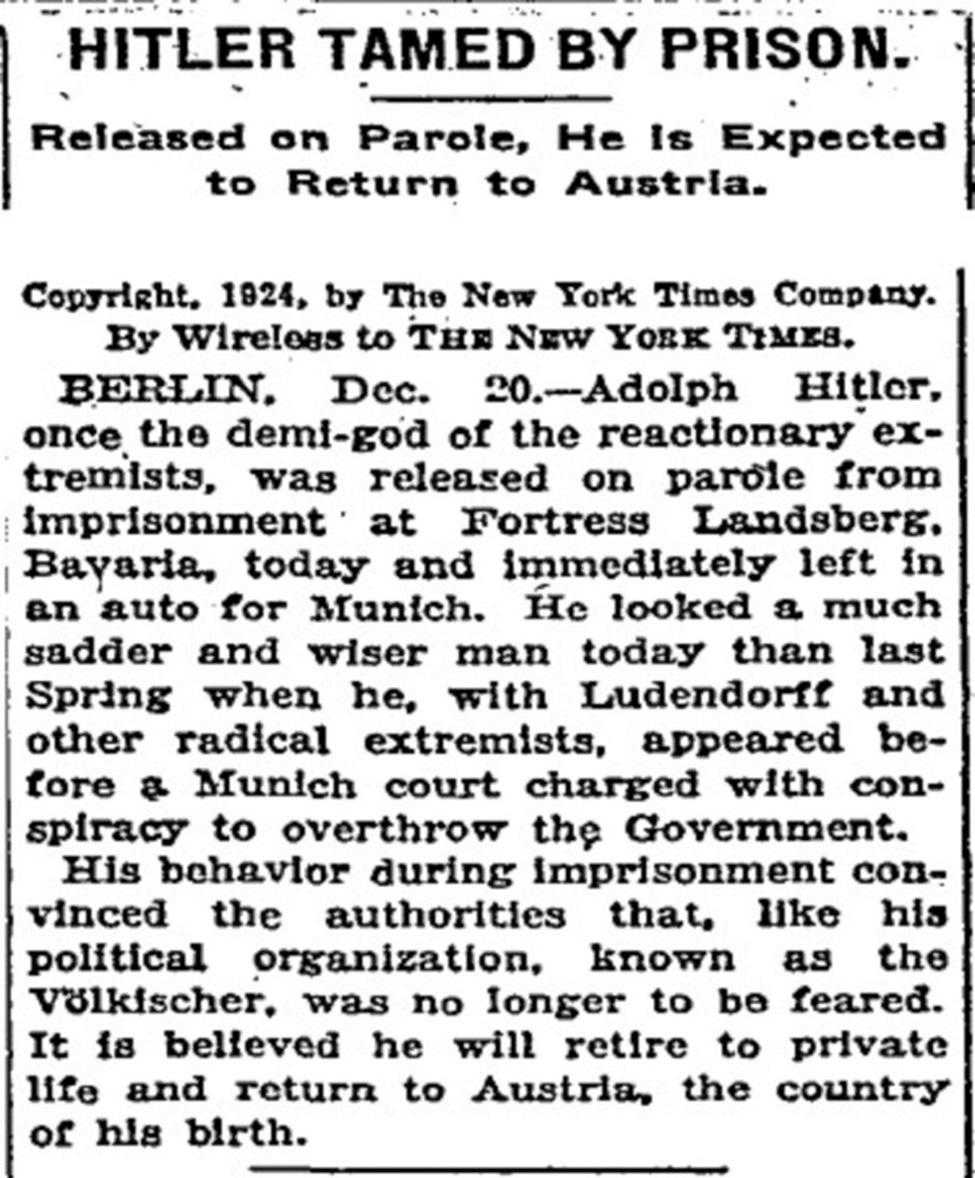
 A Litany of Thanksgiving
A Litany of Thanksgiving Have You Seen One of These?
Have You Seen One of These?

 “Those who expect to reap the blessings of freedom must…undergo the fatigue of supporting it.” – Thomas Paine
“Those who expect to reap the blessings of freedom must…undergo the fatigue of supporting it.” – Thomas Paine Message of the Month:
Message of the Month: We won a victory, I guess, in a court settlement involving the Bank of America. Apparently it had something to do with some fees the bank was charging.
We won a victory, I guess, in a court settlement involving the Bank of America. Apparently it had something to do with some fees the bank was charging.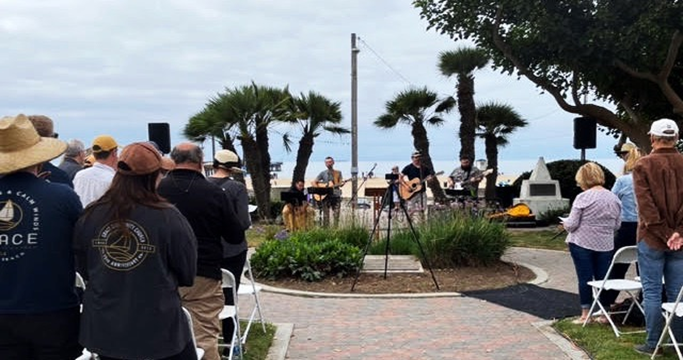 My July 16 sermon “I wanted the High Road but Jesus Gave Me the Low Road” (Mark 10:32-45) is available at: www.gracesealbeach.org
My July 16 sermon “I wanted the High Road but Jesus Gave Me the Low Road” (Mark 10:32-45) is available at: www.gracesealbeach.org “Prophets Are Good for Business”
“Prophets Are Good for Business” Business Virtues Worth Living
Business Virtues Worth Living “It does me no injury for my neighbour to say there are twenty gods or no God. It neither picks my pocket nor breaks my leg.”
“It does me no injury for my neighbour to say there are twenty gods or no God. It neither picks my pocket nor breaks my leg.” A couple of decades back the Los Angeles County Board of Supervisors removed from the county seal a cross located at the peak of the roof of Mission San Gabriel. This was a symbol of erasing religious culture before words like “cancel” became common.
A couple of decades back the Los Angeles County Board of Supervisors removed from the county seal a cross located at the peak of the roof of Mission San Gabriel. This was a symbol of erasing religious culture before words like “cancel” became common. [/vc_column_text][/vc_column][/vc_row][vc_row][vc_column][vc_column_text]
[/vc_column_text][/vc_column][/vc_row][vc_row][vc_column][vc_column_text]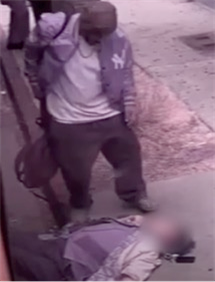
 [/vc_column_text][/vc_column][/vc_row][vc_row][vc_column][vc_column_text]
[/vc_column_text][/vc_column][/vc_row][vc_row][vc_column][vc_column_text]
 Every February for the next half-century I’ve been reminded of this as I saw this tree near my home in full blossom.
Every February for the next half-century I’ve been reminded of this as I saw this tree near my home in full blossom.  ““Congress shall make no law respecting an establishment of religion, or prohibiting the free exercise thereof, or abridging the freedom of speech, or of the press; or the right of the people peaceably to assemble, and to petition the Government for a redress of grievances.”
““Congress shall make no law respecting an establishment of religion, or prohibiting the free exercise thereof, or abridging the freedom of speech, or of the press; or the right of the people peaceably to assemble, and to petition the Government for a redress of grievances.” Back the Badge
Back the Badge “As a law enforcement officer, my fundamental duty is to serve mankind – to safeguard lives and property, to protect the innocent against deception, the weak against oppression or intimidation, and the peaceful against violence or disorder… “ – Law Enforcement Code of Ethics
“As a law enforcement officer, my fundamental duty is to serve mankind – to safeguard lives and property, to protect the innocent against deception, the weak against oppression or intimidation, and the peaceful against violence or disorder… “ – Law Enforcement Code of Ethics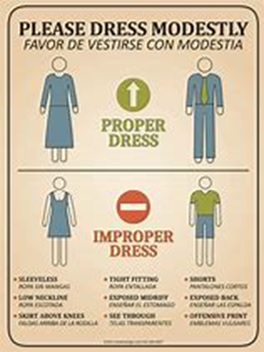 Nor does God approve of physical show-offs! “Respectable apparel” shows modesty and self-control. What is “immodest” attire? I can’t exactly define it** and cultural norms may apply. Paul has 1st century attire in the Roman world in mind. If immodesty appalled him then, what would he say about today’s immodesty?
Nor does God approve of physical show-offs! “Respectable apparel” shows modesty and self-control. What is “immodest” attire? I can’t exactly define it** and cultural norms may apply. Paul has 1st century attire in the Roman world in mind. If immodesty appalled him then, what would he say about today’s immodesty? “Truth to some is no longer empirical, no longer based on data, common sense, or even common decency – telling the truth is no longer the benchmark for public service, no longer the salve to our fears nor the guide to our actions. Truth is now considered malleable, by Opinion, Narrative, by Zero-Sum Endgames.”
“Truth to some is no longer empirical, no longer based on data, common sense, or even common decency – telling the truth is no longer the benchmark for public service, no longer the salve to our fears nor the guide to our actions. Truth is now considered malleable, by Opinion, Narrative, by Zero-Sum Endgames.” A “Good Word” for Independence Day
A “Good Word” for Independence Day Frederick Douglass
Frederick Douglass They were peace men; but they preferred revolution to peaceful submission to bondage. They were quiet men; but they did not shrink from agitating against oppression. They showed forbearance; but that they knew its limits. They believed in order; but not in the order of tyranny. With them, nothing was “settled” that was not right. With them, justice, liberty and humanity were “final;” not slavery and oppression. You may well cherish the memory of such men.
They were peace men; but they preferred revolution to peaceful submission to bondage. They were quiet men; but they did not shrink from agitating against oppression. They showed forbearance; but that they knew its limits. They believed in order; but not in the order of tyranny. With them, nothing was “settled” that was not right. With them, justice, liberty and humanity were “final;” not slavery and oppression. You may well cherish the memory of such men.
 Forgiveness Principle #4 – Forgiveness is primarily Inter-relational; it is not primarily Therapeutic.
Forgiveness Principle #4 – Forgiveness is primarily Inter-relational; it is not primarily Therapeutic. “Those who expect to reap the blessings of freedom must…undergo the fatigue of supporting it.” – Thomas Paine
“Those who expect to reap the blessings of freedom must…undergo the fatigue of supporting it.” – Thomas Paine The Dodgers and
The Dodgers and What happened recently between the Los Angeles Dodgers and the Sisters of Perpetual Indulgence has been a three-ring circus.
What happened recently between the Los Angeles Dodgers and the Sisters of Perpetual Indulgence has been a three-ring circus.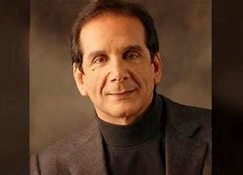 “I believe that the pursuit of truth and right ideas through honest debate and rigorous argument is a noble undertaking.”
“I believe that the pursuit of truth and right ideas through honest debate and rigorous argument is a noble undertaking.”
 EASTER’S MESSAGE – “Christ died for our sins… he was buried…he was raised on the third day.”
EASTER’S MESSAGE – “Christ died for our sins… he was buried…he was raised on the third day.”

 April is Indeed a Taxing Month!
April is Indeed a Taxing Month! If you falter in a time of trouble,
If you falter in a time of trouble, On Leaving a Church or Denomination
On Leaving a Church or Denomination “The Sermon on the Mount”
“The Sermon on the Mount”
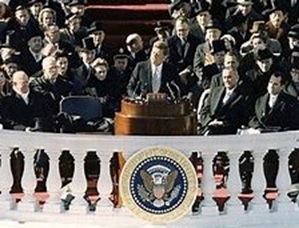 President John F. Kennedy spoke exactly right in his inaugural speech on January 21, 1961 – “…the same revolutionary beliefs for which our forebears fought are still at issue around the globe—the belief that the rights of man come not from the generosity of the state but from the hand of God.”[/vc_column_text][/vc_column][/vc_row][vc_row css=”.vc_custom_1598373738095{border-radius: 3px !important;}”][vc_column][vc_column_text]
President John F. Kennedy spoke exactly right in his inaugural speech on January 21, 1961 – “…the same revolutionary beliefs for which our forebears fought are still at issue around the globe—the belief that the rights of man come not from the generosity of the state but from the hand of God.”[/vc_column_text][/vc_column][/vc_row][vc_row css=”.vc_custom_1598373738095{border-radius: 3px !important;}”][vc_column][vc_column_text]
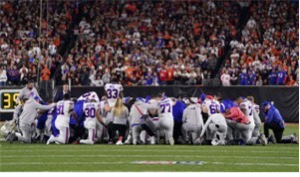 Now is as good a time as ever to be trained in Cardiopulmonary Resuscitation (CPR) and the use of an Automated External Defibrillator (AED).
Now is as good a time as ever to be trained in Cardiopulmonary Resuscitation (CPR) and the use of an Automated External Defibrillator (AED). Cardinal Joseph Ratzinger* once told a gathering of bishops and cardinals they needed to lower the temperature during a heated debate.
Cardinal Joseph Ratzinger* once told a gathering of bishops and cardinals they needed to lower the temperature during a heated debate.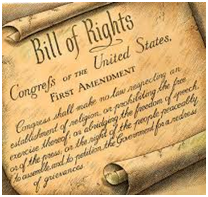 “Congress shall make no law respecting an establishment of religion, or prohibiting the free exercise thereof, or abridging the freedom of speech, or of the press; or the right of the people peaceably to assemble, and to petition the Government for a redress of grievances.”
“Congress shall make no law respecting an establishment of religion, or prohibiting the free exercise thereof, or abridging the freedom of speech, or of the press; or the right of the people peaceably to assemble, and to petition the Government for a redress of grievances.” • PEARLS BEFORE SWINE © Stephan Pastis. Reprinted by permission of ANDREWS MCMEEL SYNDICATION. All rights reserved.
• PEARLS BEFORE SWINE © Stephan Pastis. Reprinted by permission of ANDREWS MCMEEL SYNDICATION. All rights reserved.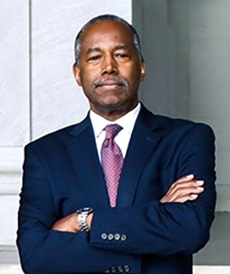 Very possibly, if some school board members and activists have their way. Regardless of his medical accomplishments and public service and his role model for aspiring students, many resent his service in the Trump Administration, where he served as Secretary of Housing and Urban Development. Carson grew up in Detroit as a disadvantaged child.
Very possibly, if some school board members and activists have their way. Regardless of his medical accomplishments and public service and his role model for aspiring students, many resent his service in the Trump Administration, where he served as Secretary of Housing and Urban Development. Carson grew up in Detroit as a disadvantaged child.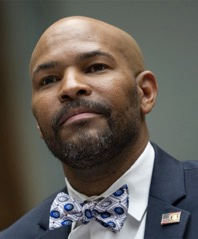 Former Surgeon General Jerome Adams, who served in that role during the Trump Administration, found that jobs can be hard to come by.
Former Surgeon General Jerome Adams, who served in that role during the Trump Administration, found that jobs can be hard to come by.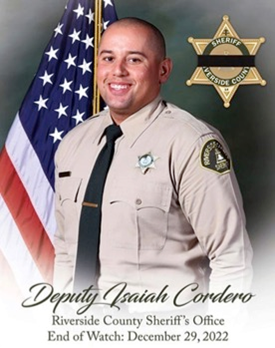 Back
Back “As (Cordero) approached the vehicle, the suspect produced a (handgun) and shot the deputy,” Riverside (CA) Sheriff Chad Bianco told reporters Thursday night. Deputy Cordero died of his wound.
“As (Cordero) approached the vehicle, the suspect produced a (handgun) and shot the deputy,” Riverside (CA) Sheriff Chad Bianco told reporters Thursday night. Deputy Cordero died of his wound. A Hancock County (Indiana) police officer pulled over murder suspect Bryan Kohberger and his father, Michael.** Traffic on the Interstate made it hard for the officer to hear occupants of the vehicle.
A Hancock County (Indiana) police officer pulled over murder suspect Bryan Kohberger and his father, Michael.** Traffic on the Interstate made it hard for the officer to hear occupants of the vehicle. Message
Message We Need More Like “Good King Wenceslas”
We Need More Like “Good King Wenceslas” Maturity in Christ
Maturity in Christ